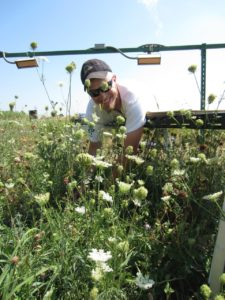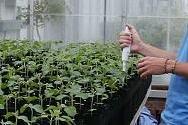Welcome to The Lau Lab at Indiana University. Research in the lab focuses on community ecology and evolutionary ecology. We study how plant populations respond to human-caused environmental change, the ecology and evolution of species interactions, and natural selection in the wild.
Liz Schultheis
Liz completed her PhD in Summer 2016 and went on co-found DataNuggets, a popular educational tool that uses small authentic datasets to teach elementary through high school students how to answer questions with data and how to create and interpret graphs. She is now Education and Outreach Coordinator for the Long Term Ecological Research (LTER) program at the W.K. Kellogg Biological Station (KBS). You can read more about here work at https://ehschultheis.wordpress.com
Kane Keller
Kane completed his PhD in Summer 2016, went on to a postdoc at the University of Minnesota, and is now an Assistant Professor at Cal State University, Bakersfield. Kane is a community ecologist studying how mutualisms and other symbioses influence plant community ecology.
Effects of global warming on invasive vs. native species
 Global warming is often hypothesized to facilitate biological invasions. We tested this hypothesis by planting phylogenetically paired invasive, non-invasive exotic, and native species into an experimental field heating array at KBS. Preliminary results suggest that although species vary in warming response, native and invasive species on average respond similarly. Interestingly, invasive species differ dramatically from non-invasive exotic and native species in phenological response to warming. Invasive species substantially advance flowering under warmer conditions, but native and non-invasive exotic species do not. Additional analyses measure herbivory to test how global warming influences the strength of enemy release, building on previous work testing the enemy release hypothesis by former student Liz Schultheis.
Global warming is often hypothesized to facilitate biological invasions. We tested this hypothesis by planting phylogenetically paired invasive, non-invasive exotic, and native species into an experimental field heating array at KBS. Preliminary results suggest that although species vary in warming response, native and invasive species on average respond similarly. Interestingly, invasive species differ dramatically from non-invasive exotic and native species in phenological response to warming. Invasive species substantially advance flowering under warmer conditions, but native and non-invasive exotic species do not. Additional analyses measure herbivory to test how global warming influences the strength of enemy release, building on previous work testing the enemy release hypothesis by former student Liz Schultheis.
The evolution of legume-rhizobia mutualisms
 The legume-rhizobium symbiosis is a classic example of mutualism. Leguminous host plants trade carbohydrates for the nitrogen fixed by their rhizobium symbionts. In collaboration with Katy Heath (U. of Illinois), we are investigating how long-term nitrogen addition treatments at the KBS LTER have influenced the ecology and evolution of rhizobium populations and their Trifolium host plants. Nitrogen-rich environments have been hypothesized to shift the legume-rhizobium mutualism towards parasitism because plants can obtain nitrogen more efficiently from the abiotic environment than from their rhizobium symbionts. We find that long-term nitrogen addition experiments have caused the evolution of less mutualistic rhizobia (Weese et al. 2015), that horizontal gene transfer has contributed to the evolution of less cooperative rhizobia (Gordon et al. 2016), and have identified the genes underlying these evolutionary responses (Klinger et al. 2016). Our current work investigates the ecological consequences of these evolutionary changes and how the evolution of reduced cooperation influences pollinators, herbivores, and soil nitrogen availability.
The legume-rhizobium symbiosis is a classic example of mutualism. Leguminous host plants trade carbohydrates for the nitrogen fixed by their rhizobium symbionts. In collaboration with Katy Heath (U. of Illinois), we are investigating how long-term nitrogen addition treatments at the KBS LTER have influenced the ecology and evolution of rhizobium populations and their Trifolium host plants. Nitrogen-rich environments have been hypothesized to shift the legume-rhizobium mutualism towards parasitism because plants can obtain nitrogen more efficiently from the abiotic environment than from their rhizobium symbionts. We find that long-term nitrogen addition experiments have caused the evolution of less mutualistic rhizobia (Weese et al. 2015), that horizontal gene transfer has contributed to the evolution of less cooperative rhizobia (Gordon et al. 2016), and have identified the genes underlying these evolutionary responses (Klinger et al. 2016). Our current work investigates the ecological consequences of these evolutionary changes and how the evolution of reduced cooperation influences pollinators, herbivores, and soil nitrogen availability.